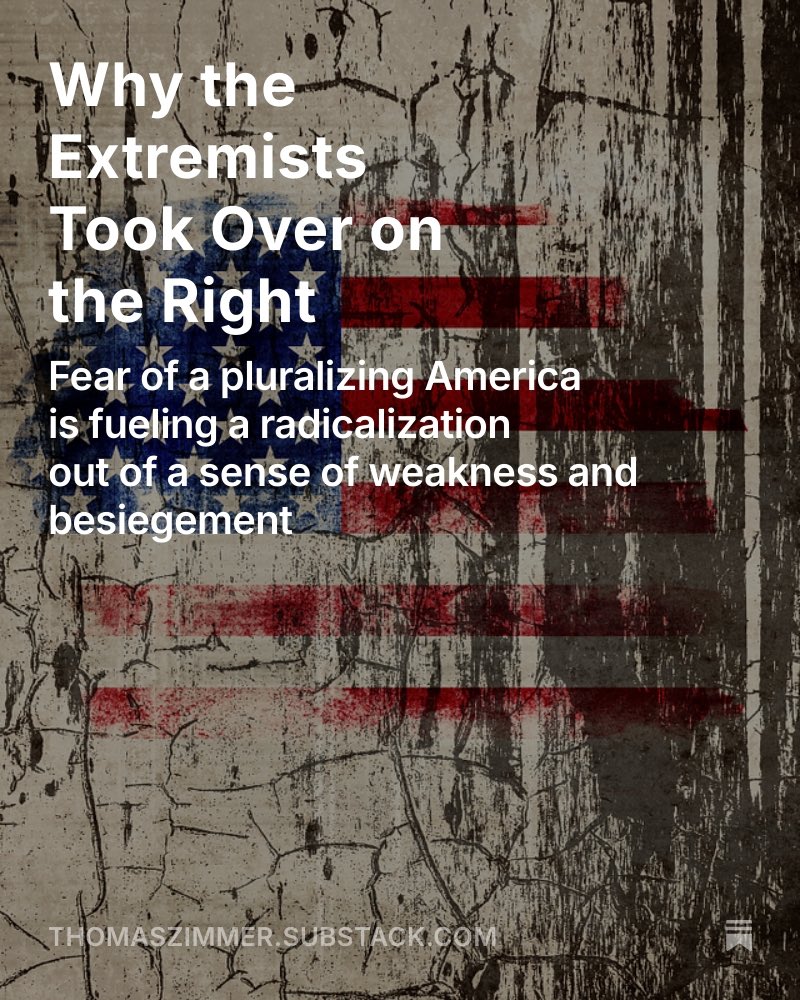Thread: On polarization, “consensus,” and multiracial democracy in American history.
I’m writing a book about the idea of “polarization” and how it has shaped recent American history. @JakeMGrumbach is making a crucial point here, and I’d like to add a few thoughts: 1/
I’m writing a book about the idea of “polarization” and how it has shaped recent American history. @JakeMGrumbach is making a crucial point here, and I’d like to add a few thoughts: 1/
https://twitter.com/JakeMGrumbach/status/1392568517493288961
First of all, @JakeMGrumbach is right: Political “consensus” was usually based on a bipartisan agreement to leave the discriminatory social order intact and deny marginalized groups equal representation and civil rights. A white male elite consensus was the historical norm. 2/
https://twitter.com/JakeMGrumbach/status/1392569436536672258
The frequently invoked “consensus” of the post-World War II era, for instance, was depending on both parties agreeing that white patriarchal rule would remain largely untouched. “Civility” was the modus operandi between elites who adhered to that order. 3/
By the 1960s, however, white elite consensus had fractured and America split over the question of whether or not the country should become a multiracial democracy: a system in which all citizens count equally and elect a representative government with majoritarian rules. 4/
Over time, one party came to advocate this liberal, multiracial version of democracy – while the other is committed to do whatever it takes to prevent what conservatives believe would be the downfall of “real” (read: white Christian patriarchal) America. 5/
It was not at all a coincidence that “polarization” started when one party decided to break with this white elite consensus and support the civil rights legislation of the 60s. 6/
In many ways, “polarization” is the price U.S. society has had to pay for real progress towards multi-racial democracy – there is absolutely no need for polarization-induced nostalgia. 7/
Unfortunately, that type nostalgia is exactly what characterizes much of the broader polarization discourse. For proponents of a centrist realignment in American politics, in particular, “polarization” is the great evil, the root cause of all that plagues the country… 8/
…and a return to a golden age of consensus (the 1950s!) is the goal – a supposedly better time before radical activists and a mean cancel culture threatened peace and prosperity (and it is really quite telling that much of the anti-polarizers’ ire is focused on “the Left”). 9/ 

But it’s not just journalists and pundits who fall for consensus nostalgia – it is quite prevalent in the work of political scientists and historians as well who have adopted the “polarization” concept as the framework for their analysis. 10/
For a longer discussion of the pitfalls of using #polarization as a governing historical or political paradigm and the challenges of writing a (pre-)history of the polarized present, see my @ModAmHist piece from 2019. 11/
https://twitter.com/tzimmer_history/status/1198206896668389378
In short, telling the history of recent decades as a story of polarization tends to create a narrative of the American polity in decline. “Polarization” is almost always used as a pejorative term: it is meant to invoke dysfunction, instability, conflict. 12/
The terminology suggests that the status quo ante against which the polarized decades since the 1970s are measured was one of unity and order. The polarization interpretation, almost by definition, casts the “consensus” of the postwar era in a problematically favorable light. 13/
The implied nostalgia for a supposedly better, pre-polarization era shines through even in generally excellent work, such as Steven Levitsky’s and Daniel Ziblatt’s investigation of “How Democracies Die.” /14
Levitsky and Ziblatt provide a convincing dissection of how the pre-1960s “consensus” was based on racial exclusion and depended on a cross-party agreement amongst white men to leave white supremacy intact. 15/
And yet, in the end, the authors still combine a warning against the dangers of polarization with praise for the mid-twentieth-century consensus era that was supposedly characterized by “egalitarianism, civility, sense of freedom.” (p. 231) 16/
Historians are not at all immune to the misleading nostalgia that often comes with the polarization framework. Let’s look at Jill Lepore’s grand retelling of U.S. history in “These Truths,” for instance. 17/
Lamenting the end of a “midcentury era of political consensus,” Lepore diagnoses “division, resentment, and malice” as the animating forces in American politics since the late 1960s. 18/
In her interpretation, “wrenching polarization” brought “the Republic to the brink of a second civil war” and shaped America “to the detriment of everyone.” (quotes on p. 633, 658, 546) But what if it did not? “Everyone” is certainly doing some heavy lifting here… 19/
Bottom line: Let’s be more critical about a paradigm that can’t distinguish between the fact that, in a vacuum, unity is good—and the fact that in the reality of American history, consensus politics always stifled necessary change and real political and social advancements. 20/
If the goal is to capture the central development in recent history and the crucial threat to democracy as precisely as possible, we need to de-emphasize the concept of “polarization” and instead foreground the radicalization of the conservative movement and the GOP. /end
• • •
Missing some Tweet in this thread? You can try to
force a refresh






